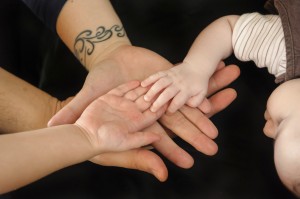
A study by researchers from four top universities has found that forty percent of American babies are failing to develop what psychologists call “secure attachment” — strong emotional bonds with their parents — which puts them at higher risk for dropping out of school and having social problems as adults.
Researchers found that children under age three who fail to develop strong emotional bonds to their parents or caregivers are more likely to be aggressive, defiant and hyperactive in later years. For children growing up in poverty, poor parental care and weak emotional attachment were strongly linked to failure to finish school.
The forty percent of children who lacked strong attachments with their parents were also more likely to have poorer language skills and behavior before they started school. Among the children without strong parental attachments, 25 percent said they avoided their parents when the youths were upset (because the parents were not meeting their emotional needs).
Conversely, children who were emotionally supported by their parents and who had formed strong attachments to them showed more resilience in the face of life adversities such as poverty, family instability, parental stress and depression. Indeed, children who had grown up poor, but were parented with care and concern, were two and a half times less likely to have behavior problems at school.
For their analysis, researchers reviewed data from the Early Childhood Longitudinal Study of 14,000 children born in 2001 in the United States; the sample was representative of the nation. The research team also reviewed more than 100 academic studies. The universities involved in the project were Princeton University, Columbia University, the London School of Economics and Political Science and the University of Bristol. The report was published recently by the Sutton Trust, a London-based institute that publishes research papers on education and social mobility.
How Do Children Form Strong Parental Attachments?
Researchers involved in the study, and psychologists who did not participate in the study, note that children bond with their parents through simple, consistent acts of love and concern by the parents.
The days are long gone now when a lot of pediatricians used to tell parents to let their babies ‘cry it out’. Most child experts, and the researchers who did the above study, agree that it is best for parents or caregivers to respond quickly when their baby is crying. This teaches the infant that their world is a ‘safe’ place, that they are loved, and that their feelings matter. That in turn helps them to be more confident in themselves and control their emotions better as they get older.
Another simple way through which babies bond with their parents is when parents hold them tenderly and talk to them in soft voices.
Parents should aim to spend quality time with their growing infants every day. It’s not enough to simply feed the baby and keep him or her clean; parents should take time often to engage in one-on-one gentle play with their children, from the time the child is able to interact more (about three months of age), on through. Even before a child is able to speak, they love hearing their parents’ voices; they love for their parents to talk to them lovingly and engage in play with them.
If a parent finds herself or himself overwhelmed, that parent should reach out to family members, friends and community for support. Is your spouse or a trusted friend or relative available to babysit while you take a few hours for yourself? Sometimes, all you need is a little “me” time, to unwind and recharge the battery, so that you can resume your parenting responsibilities with love and gladness.
A simple change of scenery or routine for a few hours can help readjust your perspective in times of stress. Could your parents babysit for a few hours now and then? This could be fun for them and your baby alike! Or as your child gets older, if you have friends who are also parents, you can take turns babysitting, so that some of you can get away for a bit.
Always remember that your little person counts on you for everything — it’s a great responsibility, but if viewed in the right perspective, it’s also a wonderful gift that you’ve been given.
By Lisa Pecos
